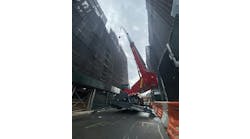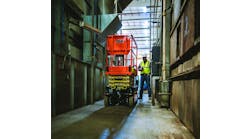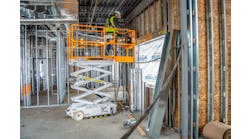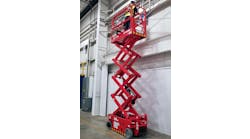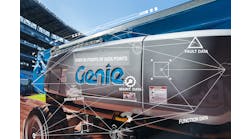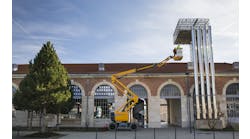Hurry up, the plane is leaving.
That's one of the Sunstate Equipment mottos. But what do airplanes have to do with equipment rental? The answer is simple.
Some years ago, Southwest Airlines adopted this slogan. The company figured out it could be more profitable if it shortened the turnaround time between flights, thus getting more flights per day per plane. It's the same concept in rental. Sunstate Equipment, Phoenix-based multi-regional rental company, determined it could maximize efficiency and profitability by turning a piece of equipment around quicker after it came off rent. The company established a goal that from the time equipment hits the yard when it is returned, to the time it's back on the ready line, checked, serviced and washed, no more than four hours should pass.
Can Sunstate always meet that goal? Not every time, but it comes close.
“Sometimes you get overloaded with equipment and it takes longer than that,” says Chris Watts, president and chief operating officer. “And sometimes a machine needs parts or service. But we'll run through the basic functions on each machine and check all the fluids and all the inspection points that need to be looked at without fail.” And more often than not, the four-hour goal is achieved, making the company more efficient and boosting utilization by having more units available for rent.
If ever there was a company that constantly strives for improvement, it is Sunstate Equipment. Of course most companies work to be more efficient and improve operations if they want to stay in business, especially in these recessionary times, but few do it with the passion of Sunstate, through good times and bad.
It all starts with Sunstate's hard-working chairman and founder Mike Watts, who is always working on some new pilot or test program to improve aspects of the company's performance. Watts, still going strong in his early 60s, is never satisfied, and has a long list of initiatives in mind to improve the company's efficiency and performance. The restless Watts, who doesn't like to sit through lengthy meetings, while hands on and involved with a wide range of projects, concentrates on the big picture and confidently delegates authority to his staff. His top management, including CEO Benno Jurgemeyer, a 17-year Sunstate veteran; son Chris Watts, president and COO; director of sales Larry Cox; chief financial officer Garth Price; regional managers and others, are empowered to think creatively, make decisions and constantly look for ways to do things better.
Sunstate Equipment was born in 1977, when Mike Watts, who had worked in sales for several years at Phoenix-area rental company Apache Rentals, worked out a deal to acquire single-location Phoenix rental center Beldon Rentals. To have grown from a single location, grossing about $200,000 a year in rental revenue, to its current status — 58 locations, nearly $250 million in 2006 revenue (estimated by RER), and ranked No. 12 on the RER 100 listing of largest North American rental companies based on rental volume — is strong evidence of Sunstate's conscientious efforts to provide the best possible service to its customers. Its constant analysis of its procedures and practices and willingness to change has added to a culture that emphasizes putting the customer and the company before individual goals.
Evidence of that is Sunstate's philosophy regarding compensation of sales staff. Unlike the overwhelming majority of rental companies, Sunstate doesn't compensate its sales staff based on commission, but rather on salary. Watts and other managers cite good reasons for this practice, not the least of which is the emphasis on working for the good of the company rather than personal goals.
“That evolved when I worked back at Apache,” says Watts. “I had sales reps on commission and they would spend a fair amount of time at the end of each day in the office verifying and getting assurance that they were going to get credit for items that went out on rent. That is unproductive time.”
At Sunstate, sales reps are part of the overall company effort. Sales reps are expected to join associations and occasionally attend dinners with contractor groups after hours. They are also expected to, at the end of the day, call in to dispatch and say, “I'm in this part of town and headed your way, can I pick up anything for you?”
“It assists us if he can pick up a light tower or generator to save us a pickup and while he's there, talk to the customer,” says Watts. “If somebody is on commission, there is less willingness. Also, when on commission, they are less willing to present to the customer the fact that we've got pumps or 3 kW generators or any other smaller items that they might need from time to time that give us a greater return on investment than the big stuff.”
Watts points out that Sunstate sales reps are compensated as well or better than most rental industry commissioned sales reps, and salaried reps are still eligible for bonuses based on what they produce. However, working on a salary basis, Watts says, brings about a subtle change in attitude where the salesmen's approach to a customer is based more on “how can I get more business for the company?” rather than “how can I make more money?”
Director of sales Larry Cox says the salary approach naturally enhances teamwork. “They don't worry about getting credit for the sale at all,” says Cox. “The only thing they worry about is whether or not that customer is doing business with us. Plus, sometimes personalities don't necessarily click. If a salesman is having a hard time getting in to see a particular contractor or prospective customer, or he's gotten in there once but they just don't mesh, he might say to one of his colleagues, ‘Hey, why don't you try this guy, I'm not having any luck with him.’ They have incentive to do that because everybody wins when we win the customer as a team.”
Southern California regional sales manager John Perry, who managed the commission-based sales program at another rental company before coming to Sunstate, calls himself a convert to the Sunstate system. “There's so much cross-information that goes back and forth among the sales team, so it becomes greater than the sum,” he says. “If you've got a guy working one territory, but the decision-maker [on a project] is somewhere else, we've got a system in place that allows him to go make the call while another salesman calls on the [decision-maker] at the other end. It works to the point where I call it a strategic advantage.”
Discovering Aerial
Constant re-evaluation informs Sunstate's equipment mix evolution, which contributed to the company's major growth spurt during the 1990s. For many years, Sunstate avoided carrying a large aerial fleet. However as aerial work platforms advanced in quality and versatility, and as increasingly larger percentages of contractors utilized them on a regular basis, Sunstate realized the vast potential in the aerial rental marketplace.
“As we developed the business in Phoenix, there was not a lot of vertical stuff,” says Watts. “There was a lot of dirt work, a lot of housing, so our business was built around dirt with skip loaders, backhoes, water trucks, air compressors, light towers, [equipment used in] building bridges and highways. Not so much going vertical. We saw the entry into aerial by others, but also saw that when it cycled down, those guys were killing each other with pricing because there was a surplus. But we had all these customers telling us if we bought aerials, they'd rent them from us.”
Sunstate finally did, ramping up its aerial inventory from 5 percent of the company's fleet to 25 percent to about 35 percent today. Watts says he can foresee a day when 60 percent of Sunstate's fleet will be aerial.
“As machines developed, aerials became better engineered,” Watts says. “We are making the push more into aerial because we see that as a continuing long-term opportunity.”
It's the people
Among the many factors contributing to Sunstate's remarkable growth from small independent to multi-regional powerhouse that extends from California in the west to Oklahoma and Texas in the middle of the country, is its emphasis on people and training.
Strong in the belief that a rental company is only as strong as its people on all levels, Sunstate management began developing training programs early on. Initially the programs focused on computer skills as employees often lacked them. But as people increasingly entered the work force with sophisticated computer skills, this became less necessary, compared to developing business skills.
To improve the effectiveness of its inside sales staff, Sunstate partnered with a company that records calls and uses them for training, helping counter staff maximize opportunities in their conversations with customers, particularly on the phone.
“What we learned was people would call and say, ‘This is Charley, have you got a backhoe?’ and people would say ‘uh’ or ‘um’ and not really respond and be conversant,” says Watts. “We began holding people to a much higher level of accountability. Never let the conversation drag out so all the customer hears is ‘click click click’ while you're looking on the computer.” As counter people improve their ability to engage the customer conversationally, they express interest in the customer and learn about the customers' jobs, and, as a result, offer customers more equipment solutions.
The company utilizes similar techniques in its sales training, actually videotaping sales reps in role-playing situations and then analyzing their performance, helping them to improve the way they speak, the way they carry themselves as well as how they counter objections customers might raise.
Sunstate management takes the same approach to looking at salespeoples' call reports. “Once you start to read them, you ask questions,” Watts says. “Specifically, if the salesman says a contractor rents only from [a particular competitor], what was your rebuttal? We spend a tremendous amount of time working on that, to get them up to speed and continually developing their skill set.”
Watts admits he can be “almost fanatical” in urging staff to find the real meaning behind what customers say. “I was on the phone with sales managers and I said, ‘I want to qualify what you're talking about when you tell me these projects are not going to take place because of the financing,’” Watts says. “‘Specifically what does that mean? Is it because the owner didn't want to pay the higher cost of financing? Did he no longer have access to financing? Did he choose to hold off because it was going to be a strip center and he couldn't get any retail tenants? Is it because the retail tenants can't get the financing?’ So we try to drill down on every aspect to better understand, so we can plan ahead how to work in that market.” That type of questioning also enables the sales person to better understand how to work with that particular client.
The 90-Minute Rule
In addition to engaging customers more conversationally on the telephone, counter staff is trained to, essentially, say yes first and then figure out how, unless the customers' request is unusual, calling for large quantities or equipment Sunstate only stocks in short supply.
“The counter people are basically trained to say yes,” says Chris Watts. “Then it's dispatch's problem. If somebody says they need something in 90 minutes, we can do it. We're all about making it happen. That 90-minute commitment kind of made us famous here in Phoenix.”
Chris Watts acknowledges, however, that the counter person needs to be smart about it and such promises may be easier to fulfill in the Phoenix area where there are seven stores in the spread-out metropolis than in cities where there may be only one store and smaller quantities of equipment. Counter staff can almost instantly check availability on the desired equipment, but still needs an overall knowledge of the company's fleet and what is likely to be available. If the item is common, such as a 19-foot scissorlift, the counter person rarely has a problem. “For the most part, we can make it happen,” says Chris Watts. “We have enough fleet, enough trucks, and we can deliver anywhere in the Valley. If someone wants a 19-foot scissors, I don't need to look, unless he wants 50 of them. If he wants an 80-foot boom or another item that we don't stock a lot of, he'd better look.”
Chris Watts emphasizes that if the company can't make it in 90 minutes, to call the customer and let them know. “We pick up the phone and say, ‘I know we committed to you in this time, but here's the situation, it's going to take us this long, will that still work for you?’ Most customers have no problems with that, they can plan accordingly. It only upsets them when you don't call.”
Making sure the right inventory mix is available on a daily basis is, to a large degree, the responsibility of the branch manager. Unlike some rental companies that have another layer of management in the shop to manage the work flow, Sunstate puts that responsibility on the branch managers.
“Our branch managers are very involved in what's going on at the counter, in dispatch and what's going on at the shop,” says Chris Watts. “A branch manager has to be a multi-talented guy. He knows if we're losing rentals on particular items because of lack of availability. He looks at the equipment in the yard, he looks at his wash rack, and he says, ‘OK, on my ready line, I've got no wheel loaders and on my wash rack I've got three wheel loaders. I bet the next phone call will be somebody for a wheel loader. So let's do that now.”
The branch manager meets with the shop staff every morning to discuss the work flow for that day. And then throughout the day, it's constant hands-on management. “It's not sitting in the office and hoping it all works out,” says Chris Watts. “He has to drive those processes. That's a slight difference in how we do things because the branch manager has that responsibility instead of some other layer of administration.”
Another difference in Sunstate's methodology is the ordering of parts and equipment. The branches for the most part carry only a small amount of constant-use parts such as oil filters and fuel filters and key items that are burned through daily. Parts are typically ordered on an as-needed basis, but Sunstate managers don't want shop personnel to spend their time on the phone ordering parts.
“We got guys who fix equipment, who are mechanics in our shops, and we have people that answer phones and order parts and other paperwork in the office,” Chris says. “In larger branches there is more division of labor, but for the most part, we put administrative duties on administrative people. We want our shop guys fixing equipment, not spending 30 minutes talking on the phone or filling out purchase orders.”
10-4
Like many rental companies, embracing new technology must include more efficient dispatching and currently Sunstate is rolling out and testing a new dispatch system. Once the counter person books the order, it will take 10 seconds for the order to reach the dispatcher electronically. The dispatcher will have access to the Wynne-designed inventory system. One of the advantages of the new system is usage of electronic pre-set messages, which frees on-air time to concentrate on communications of highest priority. If a driver simply needs to report that he has delivered a machine and is off to his next assignment or is starting or ending lunch, a couple of simple keystrokes sends that message. If the dispatcher is concentrating on helping a driver who needs immediate assistance, such as calling a customer if he can't be found, the dispatcher can open less urgent messages at his leisure. Graphic dispatch will show on a map the actual locations of all rental equipment off rent and service calls, not just trucks. This is to ease the burden of the dispatcher and facilitate more timely deliveries.
Sunstate also has a team devoted to asset management, headed by Patti Lutz, managing maximizing fleet utilization, transferring fleet, buying and analyzing fleet. The team has a model that shows the holding time for each category of equipment based on its re-sale value, operating costs and repairs and evaluates how best to dispose of fleet.
The company's safety efforts — led by corporate risk manager Don Cash — have also paid off in a big way. When Sunstate found that it's rating by the Department of Transportation was too high, the company ramped up its safety program and safety incentives to its staff, resulting in a nearly 100-percent improvement in its DOT rating.
Having a Voice
Communication among 1,000 employees in 58 branches can be challenging. The senior management team visits each branch once or twice a year, and Watts himself regularly visits branches. In fact Watts frequently visits branches unannounced, and he and Cox say usually they see few surprises, finding everything running exactly as it should.
To encourage open communication, Sunstate has a suggestion system, with financial incentives for suggestions that are taken up, even if they are altered somewhat in implementation. No suggestion is turned down until reviewed by Chris Watts, ensuring that all ideas are reviewed by the top levels of management.
Another Sunstate innovation is the reverse review, where all employees must give feedback on the performance of their immediate supervisors. “Sometimes it takes a while for new employees to feel comfortable with it, feeling ‘This is against anything I've ever been taught. I can't speak badly about that guy, I'll be fired!’ says Watts. “But once they sign on to it and see how it works, it truly holds those that otherwise might have a big ego as a manager in check.” It also demonstrates to Sunstate employees that their views are important, that analysis of how the company is functioning is valued coming from all levels of employees.
Back to the Future
In the rental business for nearly 40 years, the current recession is obviously not the first one Mike Watts has been through. In fact, when Watts acquired Beldon Rentals in 1977, the country was in the middle of a fierce recession that discouraged many from launching businesses.
Watts was inspired to go into business for himself when Apache Rentals, where he worked as a salesman and then rental manager, hired a consultant whose strategy was for the company's sales people to gain business by finding out what equipment was on the job, undercutting the price and getting the equipment bounced off the job. And if the tactic didn't work, the consultant suggested to try to get the superintendent fired by notifying his office he was spending needless dollars.
With these ideas contrary to everything Watts believed in, he decided to find an opportunity to go into business for himself. When he acquired Beldon, a deal that took a year and a half to consummate, he changed the company, which specialized in homeowner tools, to one oriented towards the construction contractor. Watts changed the name to Sunstate Equipment. In 1981 Watts made his first acquisition, buying Phoenix-based Fuhr Rents. It acquired Dial Rentals in 1986, and in that same year opened its still current headquarters.
In 1987, faced with the continual difficulty of obtaining tires on a timely basis, Sunstate opened Sunstate Tire Division across the street from its main branch, hiring tire expert David Hixon, who previously had his own tire business and who Watts had done business with for years, to run it.
“We would need a tire in an hour and the tire companies would say, ‘We'll get back to you tomorrow,’” says Chris Watts. The tire division services Sunstate's needs but handles outside business as well.
Watts acquired Apache Rentals, which formerly employed him, in 1988. In 1989, Sunstate started its first branch outside Arizona, in Henderson, Nev., near Las Vegas. In 1995 Sunstate opened branches in Salt Lake City and Colorado Springs, Colo., opened eight new branches in 1996 and 13 more in 1997.
In 1996 Deere & Co., interested to learn more about the rental business, acquired a 40-percent stake in Sunstate Equipment, increasing its ownership by 3 percent a year for three years until it reached 49 percent. Watts eventually bought back Deere's share in the company in late 2003.
In 1997, Sunstate, which had wanted to expand into California for years but was often stymied by the difficulty of finding property, acquired four-location Pro Rentals, based in Anaheim.
Sunstate now has 58 branches in eight states, having added four new branches in 2008. Growth is likely to slow down for the immediate future, but Watts and company have all kinds of development plans. Growth and getting bigger for its own sake have never been the driving force behind Sunstate's ambition, but at the same time, Sunstate is always looking for growth opportunities.
The recession will not stop Sunstate's growth plans but it has put a number of projects on hold and the company recently had to lay off employees for the first time in its history.
Other than hoping to buy back some of the company's bonds, Watts won't reveal much about his company's future plans, although his computer has files for a long list of planned projects and areas of expansion and improvement in almost every possible facet of what Sunstate Equipment does best — renting equipment. Watts remains optimistic about the industry in spite of the current downturn and believes that Sunstate will grow stronger as it has in past downturns.
And quickly, because the plane is leaving.
